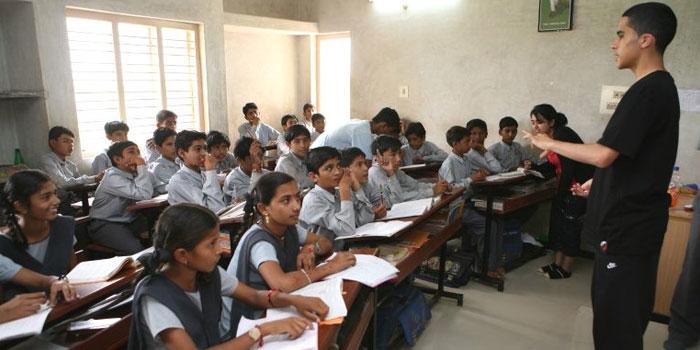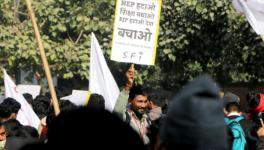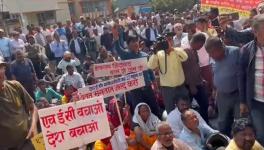Jharkhand School Teachers To Hold Mahadharna On 5th September

Image Used For Representation Purpose Only
“I have been protesting for over 15 years now, for how long should I keep doing this to get my salary? The policy for the merger of schools will only make matters worse, how will I travel so much to teach when I am not being paid,” said Sanjay Kumar Dubey, who is one of the teachers of the 5,000 schools that are being shut due to the Jharkhand government’s merger policy.
The teachers have now given an ultimatum to the state government to provide an answer to the teacher’s demands in a report. If the answers are not received by September 5, the teachers have decided to go on a state-wide strike and protests. Sanjay Kumar, who is also the president of the Teachers’ Union in the state, said, “The current policies are out to crumble the education system in the state.” There are multiple concerns of the teachers, topping the list is the discrepancies in their recruitment under the RTE.
Para teacher (teaching assistant) from Jamshedpur, Shankar Gupta explained, “I have not received my salary for more than four months now. There are discrepancies in the recruitment policy of the government, they are putting the trained teachers and the untrained ones in the same bracket. All that we have been asking for are our own minimum wages, what we rightfully deserve.”
The teachers’ associations in the state have been negotiating with the state government, with the latest attempt to stake claim to their due made on August 27. Disappointed with the government’s apathy, the teachers are set to take to the streets. As per plan, they will be staging a demonstration outside the Raj Bhavan in support of their various demands.The Mahadharna will be held from 11 a.m. to 4 p.m. The protests by the teachers have picked up pace, specially after the teachers decided to boycott the teachers’ day celebrations, earlier in August.
Apart from the issues over salaries, the teachers are agitated about a larger underlying issue- the reorganisation or the merger of schools in the state. The state has currently merged over 6,000 schools in the state. The reason cited for the merger has been the low enrolment in these schools, often situated in the remotest districts in the state. The schools which are now being shut down were a part of the vision of providing universal education in the state since the early 2000s. The new set of mergers that are set to take place between 2018-19 are leading to increased anxieties in the teachers and the students alike. Dubey added, “The schools were established to provide education to even 20 students in a particular region, now the government is shutting down schools that have more than 60 students and no justification is being offered to the teachers over the same. I am simply being given an option to either relocate or lose my job.”
A major concern for teachers is also the fact that under the second phase of the mergers, students from the disadvantaged groups will be the worst affected. With no schools in the vicinity in a particularly difficult terrain, students are likely to drop out from their new schools.
The policy guideline which came into being in July 2017, pointed to “rationalisation of small schools across the states for better efficiency.” The policy is being currently opposed by the MPs within the BJP as well, however, their direction and plans of action are not yet established. The policy was implemented in Jharkhand as the government followed suit from the apparent success of the programme in Rajasthan earlier. The government has argued that the policy will allow for a more efficient use of resources, especially of the teachers. Reacting to this, Shankar Gupta said, “There is no question of an efficient use, how will I contribute efficiently if I am earning only Rs. 8,000 a month for a huge travel cost that I will incur.” He also added that the implementation of the guidelines will not serve any purpose but only alienate both the teachers and the students.
Under the policy, the states of Odisha, Madhya Pradesh and Jharkhand were the first three picked for the 30-month programme, under which the NITI Aayog enlisted two private organisations – management consultants, Boston Consulting Group; and the Piramal Group’s non-profit, Piramal Foundation for Education Leadership – to implement the reforms.
The model has sparked fears among the teachers that this is a mere ploy to privatise and dilute the educational institutions in the state, one of the core reasons for the protests.
The restructuring of primary schools has caused an overhaul in the system of education in the state, and the civil society organisations and teachers’ unions in Jharkhand have been protesting against the mergers since February, with concerns over the loss of livelihood of the teachers and the exclusion of students. The movement is likely to get stronger with the agitations in the coming week, with no concrete arrangement in sight by the state government.
Get the latest reports & analysis with people's perspective on Protests, movements & deep analytical videos, discussions of the current affairs in your Telegram app. Subscribe to NewsClick's Telegram channel & get Real-Time updates on stories, as they get published on our website.
























